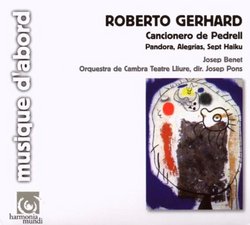| All Artists: Benet Title: Roberto Gerhard: Cancionero de Pedrell Members Wishing: 0 Total Copies: 0 Label: Harmonia Mundi Fr. Release Date: 8/12/2008 Album Type: Import Genres: Pop, Classical Styles: Vocal Pop, Ballets & Dances, Ballets, Historical Periods, Baroque (c.1600-1750), Modern, 20th, & 21st Century, Symphonies Number of Discs: 1 SwapaCD Credits: 1 UPC: 794881870127 |
Search - Benet :: Roberto Gerhard: Cancionero de Pedrell
CD Details |
CD ReviewsBrilliant though obsessive compulsive Jacques COULARDEAU | OLLIERGUES France | 03/06/2009 (5 out of 5 stars) "A refugee from Spain, or rather Catalonia, after Franco's victory, Roberto Gerhard will have a full career in England and partly in the USA. His "Alegrias" is a suite for sure, but it is symphonic music without being a full symphony. The music is overpowered with some kind of strong militaristic rhythm, like a march through some city captured by an army that takes it over. The surprising element in this strongly militaristic music, with allusions to some basic military tunes, is the soft side elements that seem to greet if not welcome the invading army. At times it is even a sort of feast or festivity or even celebration of that military victory. The "Cancionero de Pedrell" starts with a small song about a drum of some kind that has lost its musical skin and its sticks. The music is gone and lost. Then it is a song about a man who sends a nightingale to his parents to give his love to his mother but not his father because the latter married him to an unworthy woman. Then the nightingale goes on with its marrying role and enables him to marry a woman of his choice. Then a sad evocation of love that cannot be pushed away by another love, sad it is because it is some kind of pleading addressed to the woman he loves. Then the music gets back to some dynamic joy though he evokes the death his beloved is asking from him in the fight against the Moors but the crying one is the maiden, which sounds strange and contradictory. A girl is happy that her beloved Manuel becomes a priest because then she can see him. A rather sad evocation of the extremely protected status of young women in traditional Spain, in this case Galicia. The next song is sad as sad can be. The husband is working and the wife is on a church outing. The sadness of the tone evokes the impossibility for the wife and the husband to have an outing together and at the same time for the wife to have any other outing than one under the authority and control of the church. Spain, or Galicia in Spain does not seem to be a very happy country with all these constraints from religious traditions. The last piece of this collection of songs is more dynamic but it is quite impossible in meaning. A man loves a woman who is locked up in her kitchen and she cannot go out at all and express her own love for the young man. Love seems to be some kind of curse in Spain more than anything else and the end is a musical explosion that is fateful more than charming, better not love than suffer like that. The "Seven Haiku" are quite different. For one they are in French. Then they are an evocation of beautiful nature and even maybe some kind of love desire, but it is also a lamentation on his exile and the impossibility to love in such a situation. The sadness is built by an accompanying music that is like strings of pearls and beads that sound like a dirge to life, like the deepest mourning a man can carry in his heart, the mourning to the impossibility of love associated to the moon. This image that was common in another period is very romantic here, and maybe kind of banal, though the music is fascinating in its suspension, in its mid-air resonance, and in its oriental spiritual introspection with here and there the chaotic non-harmonic modernism of the systematic sonorous hiatus. The "Pandora Suite" is once again symphonic music without the name symphony. The music is very strong, powerful, even heavy and the evocation of "Psyche and the Youth" has that forbidding and overpowering dimension that makes anything joyful or pleasant impossible. "Pandora's Carnival" is full of movement and dynamic activity, but it is martial in a way or another with a regular binary marching tempo and the force of a wave that takes you along, like it or not, there is no choice at all, you have to follow. So when the monsters start their drill we are suspended in thin air and expecting to be crushed under their feet, their will to kill and destroy and we are disarmed in front of these erratic beings that do not follow any logical line and their percussive rhythm is like a pounding band of hammers on your head, skull and brain. And when it turns more regular in its harmony, the dull and dark beating behind is so regular that it is fascinatingly mesmerizing. You go along without any chance of being able to think. No thinking in this martial land. So we are not surprised when "Death and the Mothers" surge from under that pounding and try to be softer, less constricting. But then the fluid movement of the strings is cadenced behind by some drum beating. The mothers who are the symbols of life, birth giving and even love somewhere are transformed into burying undertakers. The mothers are covering up any kind of sentimental softness with a thick layer of senseless and probably meaningless wool that can choke the life of even the most powerful monster or volcano.
Dr Jacques COULARDEAU, University Paris 1 Panthéon Sorbonne, University Versailles Saint Quentin en Yvelines, CEGID" |

